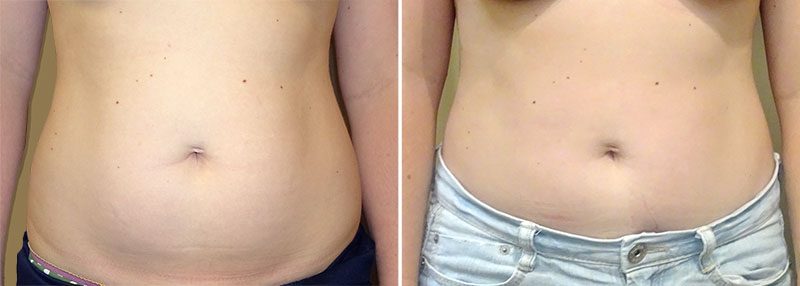
Liposuction is the most popular cosmetic procedure, and for good reason. Lipo can be performed on its own to eliminate stubborn fat pockets or added to a surgery plan to refine the results of other procedures for a more seamless, natural look.
While liposuction results are immediate, it’s important to understand what to expect in the long term to maintain your results—and your confidence! Here, board-certified Frederick plastic surgeon Dr. Henry F. Garazo answers some common questions about liposuction and shares how you can maintain your initial results.
Is liposuction permanent?
Yes, fat cells that are removed during liposuction are permanently eliminated from treated areas and cannot grow back—adults have a fixed number of fat cells within the body and thus cannot develop new fat cells. That said, the remaining fat cells in the areas you received liposuction can expand or contract with weight fluctuations.
What happens to the body years after lipo?
Your body will generally maintain the sculpted shape achieved through the procedure for years, provided you stick to a healthy lifestyle. However, the natural aging process will eventually cause a decrease in skin elasticity and muscle tone that may diminish your results as you age.

Areas that are most likely to experience changes over time
While liposuction does permanently remove fat cells from localized areas, certain body regions are more likely to experience changes over time due to a variety of factors. Common areas where patients might notice changes include:
- Abdomen: The abdomen is a common area for liposuction, particularly during a tummy tuck. The results can be long-lasting, but fat often accumulates in the midsection and flanks (love handles), especially with general weight gain or hormonal changes like menopause.
- Thighs and hips: Diet and exercise-resistant areas like the thighs and hips are commonly treated with lipo and can be prone to changes over time, particularly after significant weight fluctuations. Fat distribution in the thighs and hips is also influenced by genetics and hormonal factors.
- Arms: Liposuction is highly effective in carving out beautiful arm definition, but changes in skin elasticity due to aging can cause lax and sagging skin which can affect the appearance of the arms over time.
- Back: Back fat can be stubborn, and while it’s still no match for liposuction, weight gain can potentially alter the original results.
Realistically speaking, no area is immune to changes after liposuction. For this reason, we recommend patients be at or near a stable weight they are happy with and can maintain through healthy means to minimize visible changes long after the procedure is complete.
What happens if I gain weight after liposuction?
Gaining a few pounds after liposuction may subtly impact your results, but a small amount of excess weight gain can often go unnoticed. If you gain a considerable amount of weight, your results will change more significantly, but in most cases it won’t reverse them entirely.
One thing to understand is that the fat cells in untreated areas of your body may expand more than those in treated areas—remember treated areas have fewer fat cells post-liposuction. This could cause a disproportionate appearance where some areas show more weight gain than others. For example, if you had liposuction around your abdomen, but not on your thighs, and then gained several pounds, you might notice more fat accumulating on your thighs compared to your abdomen.
Patients can typically gain anywhere from 5-20 pounds before they see obvious impacts on their initial liposuction results. How much extra weight you can personally accommodate before it’s noticeable depends largely on your natural body frame—taller, broader people can typically gain more weight without compromising their results compared to more petite people who have smaller frames and less body mass where excess fat is distributed. Your body’s inherent fat distribution and which areas were treated will also influence how much weight it would take to alter your lipo results.
What if I lose weight after liposuction?
Losing weight after liposuction may continue to slim treated areas as remaining fat cells can shrink with weight loss. However, significant weight loss after liposuction might also lead to loose skin in treated areas, especially if you lose a substantial amount of weight and/or experience a decrease in skin elasticity due to genetics or aging.
Determining how much weight you can lose before it negatively impacts your results follows the same rules as gaining weight: it’s dependent upon personal factors and can differ from patient to patient.
How can I maintain my liposuction results?
While body changes over time are to be expected, there are straightforward lifestyle habits you can follow to enjoy optimal results for as long as is feasibly possible:
- Enjoy a diverse and balanced diet of nutrient-dense, whole foods including fruits, vegetables, lean proteins, and whole grains to maintain a stable weight and reduce the risk of fat accumulation or fat loss from marring your initial results. Getting plenty of water is also essential for maintaining skin health and elasticity.
- Incorporate both cardiovascular exercises and strength training into your workout routine. Cardiovascular exercises help burn calories, while strength training tones muscles and can help improve skin elasticity.
- Follow up with your surgeon to help you stay on track with your goals and allow for early intervention if any issues arise.
“Such a warm-welcoming place from the moment you walk in the door! The staff and Doctor are friendly and knowledgeable, they provided step by step for the procedure I was getting done which caused me to be calm and excited for it rather than nervous, everything has been going perfect from the surgery to the healing! They went beyond of what I expected. They followed up and were easy to contact when needing assistance with something. Definitely recommend getting cosmetic surgery and the other services they provide, done here! You won’t be disappointed!”
—5-star Google review
Although non-surgical fat reduction methods are available, they cannot achieve the level of fat removal or personalized contouring that makes liposuction the gold-standard treatment for body sculpting. Plus, non-surgical treatments like CoolSculpting require multiple sessions over some time before you notice potential slimming effects, and the results aren’t nearly as predictable or dramatic compared to liposuction.
Liposuction in Hagerstown
If you’re considering liposuction or have questions about maintaining your results, schedule a consultation with Dr. Henry Garazo, a board-certified plastic surgeon with over 20 years of experience. Call Plastic Surgery Services at 301-791-1800 to learn more and take the next step toward a more confident you. We proudly serve patients in Hagerstown, MD; Frederick, MD; Martinsburg, WV, and surrounding areas.
